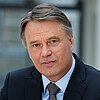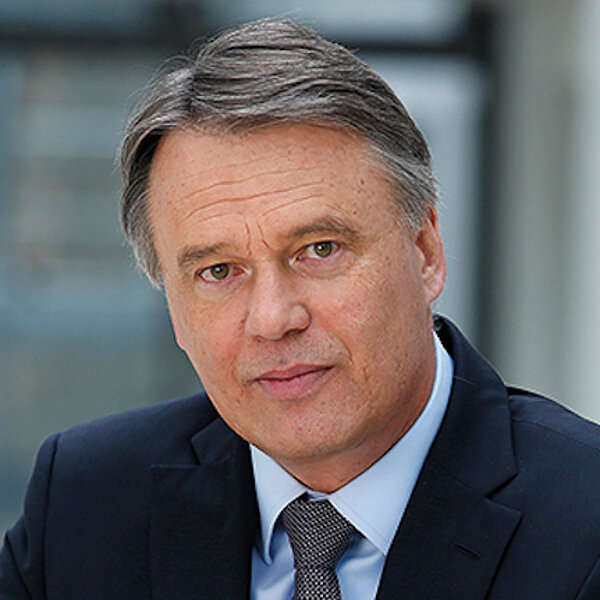
"We had to be creative."
Dr. Thomas Braun has had a significant impact on the development of regenerative medicine in Germany over the past 3 decades. In this interview, he shares insights on market challenges, a shift in implantology, and his passion for regenerative medicine.
In 1996, Dr. Thomas Braun began his career at Geistlich in Germany as Marketing and Sales Manager. Five years later, he became the General Manager of the newly founded affiliate. In this role, he laid the foundation for the success of Geistlich Bio-Oss® and Geistlich Bio-Gide® in Germany. However, the journey was far from easy; Geistlich's biomaterials were initially met with skepticism by professionals.
What prompted you to join Geistlich at the time?
To be honest, it was a mix of curiosity and the challenge of building up a completely new market. At the time, I didn't have any particular connection to the dental industry. What ultimately convinced me was the team at Geistlich. Their expertise and enthusiasm for the project were impressive. I was also immediately fascinated by the concept of regeneration.
The market barely existed at the time. How did you address this situation?
There was significant skepticism about bone substitutes because the first products simply did not deliver the promised results. Potential customers thought these materials did not work. So we did not start from scratch, but practically from below zero, in a large market like Germany with very limited resources. So we had to get creative: instead of relying on a big sales organization, we focused on expanding our educational offerings and bringing people to us. This approach allowed us to demonstrate the quality and benefits of our products, as the demand for high-quality bone substitutes was always there.
What characteristics distinguished the German dental market at the time?
The German implantology market, our core market, is heavily dominated by specialists, especially maxillofacial and oral surgeons. Unlike in many other countries, where general dentists often place implants, in Germany this work is done by specialists, which made our target audience more demanding. These professionals often had access to autologous bone sources and were therefore particularly skeptical about bone substitutes. We had to put in a lot of effort to win their trust.
How has the market developed in the last few decades?
Over the past 30 years, many things have improved. There have been significant advances in oral health: cases of severe periodontitis and caries have decreased substantially. Overall, oral health has improved, and patients are keeping their teeth later in life. At the same time, the focus of implantology has shifted. In the past, it was about providing functional care for prosthetic patients. Today, the emphasis is on esthetic single-tooth restorations with a wide range of implants. These developments have greatly influenced the demands of implantology and reshaped patient expectations.
You have recently shown no signs of fatigue and have pushed forward new products and indications. What drives you?
Seeing what can be achieved with tissue regeneration is absolutely fascinating—like the case where an entire lower jaw was reconstructed and regenerated within the patient’s own body. Being able to give a tumor patient who had lost their jaw a new one is truly fantastic and incredibly motivating. Successes like these demonstrate the immense potential of regeneration and inspire us to continue researching and exploring new possibilities.
Geistlich is known for its strong values. How do you live these values?
Trust is at the heart of Geistlich's values—nothing works without it. Whether within the organization or in our relationships with customers, trust forms the foundation of everything we do. What sets Geistlich apart is the sense of being part of a big family. Many employees stay with us for years because they feel at home here and know they are contributing to something greater. This consistency fosters long-term connections and is highly appreciated by our customers.
When you look back on your nearly 30 years at Geistlich, what stands out the most?
In summary, it was a rare opportunity to build a company from scratch and watch it grow into a market leader. We started with modest resources in the backyard of a steel company, and it took a tremendous effort to position the company where it is today. It was a true team effort, and I am proud to have been part of it. This journey has been a unique experience, for which I am deeply grateful.
What advice would you give to young doctors who want to get into regenerative medicine?
Find a mentor who is a good fit for you and work with a reputable, well-established company you can trust. Most importantly: keep educating yourself.
How do you think the industry and Geistlich will develop in the future?
We are already seeing a strong shift toward digital transformation in dentistry. Modern technologies such as digital impressions and specialized equipment are increasingly becoming the norm, which also requires significant investments on the part of the practices. The trend is moving toward larger, multi-specialty practices that offer everything under one roof. Geistlich will play a role in shaping this change by continuing to focus on innovation in regeneration and exploring new markets and technologies.


